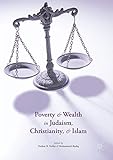Poverty and wealth in Judaism, Christianity, and Islam /Nathan R. Kollar, Muhammad Shafiq, editors.
Material type: TextPublication details: New York : Palgrave Macmillan, (c)2016.Description: 1 online resourceContent type:
TextPublication details: New York : Palgrave Macmillan, (c)2016.Description: 1 online resourceContent type: - text
- computer
- online resource
- 9781349948505
- 9781349948499
- BL65 .P684 2016
- COPYRIGHT NOT covered - Click this link to request copyright permission: https://lib.ciu.edu/copyright-request-form
| Item type | Current library | Collection | Call number | URL | Status | Date due | Barcode | |
|---|---|---|---|---|---|---|---|---|
 Online Book (LOGIN USING YOUR MY CIU LOGIN AND PASSWORD)
Online Book (LOGIN USING YOUR MY CIU LOGIN AND PASSWORD)
|
G. Allen Fleece Library ONLINE | Non-fiction | BL65.42 (Browse shelf(Opens below)) | Link to resource | Available | ocn954214906 |
Browsing G. Allen Fleece Library shelves, Shelving location: ONLINE, Collection: Non-fiction Close shelf browser (Hides shelf browser)
Includes bibliographies and index.
This book gathers scholars from the three major monotheistic religions to discuss the issue of poverty and wealth from the varied perspectives of each tradition. It provides a cadre of values inherent to the sacred texts of Jews, Christians, and Muslims and illustrates how these values may be used to deal with current economic inequalities. Contributors use the methodologies of religious studies to provide descriptions and comparisons the perspectives of Judaism, Christianity, and Islam on poverty and wealth. The book provides citations from the sacred texts of all three religions along their interpretations, contexts, and elaboration for deciphering their stances. Poverty and Wealth in Judaism, Christianity, and Islam identifies and details a foundation of common values upon which individual and institutional decisions may be made. .
Dedication ; Foreword; Preface; Contents; Contributors; List of Figures; List of Tables; Introduction; Part I: Personifications of Poverty and Wealth; Chapter 1: Reading Job 19:2-22: A Symbolic-Interactionist View of Poverty; Introduction; Symbolic Interactionism; Understanding Job 19:2-22; The Theology of a Symbolic-Interactionist Reading; Conclusion; Notes; Chapter 2: The Story of Qarun (Korah) in the Qur'an and Its Importance for Our Times; Notes; Chapter 3: Mughal Munificence: Care and Concern for the Poor in Islamic Hindustan from Tuladan to the Taj; Introduction; Tuladan; Famine Relief
Other Occasions of CharityArtistic and Architectural Expressions; Conclusion; Notes; Chapter 4: Mary's Magnificat: The Anawim and Church on the Margins; The Magnificat; The Text: Exegesis; The 'Anawim; The Magnificat and the Church on the Margins; Singing the Magnificat in a New Key; Conclusion; Notes; Part II: Doctrines About Poverty and Wealth; Chapter 5: Socioeconomic and Gender Justice in the Qur'an: Modern Challenges; Introduction; The Islamic Value System: Integrating Legal and Moral Laws; Building Blocks for Gender, Social Justice, and Socioeconomic Development
Defining the Mission of Humanity on Earth The Qur'an and Gender Equity: Critical Analysis; Family as Institution in Islam: Definitions and Meaning; Debate on Islam and Culture: Qiwamma: Responsibility Versus Power; Women Empowerment: Knowledge, Legal, and Economic Independence; Contemporary Global Economic Challenges; The Role of Muslims in Restoring Economic-Social Justice Globally; Conclusion; Notes; Chapter 6: Gospel Readings on Poverty and Affluence in Most Eastern and Western Churches; Introduction; The Byzantine Lectionary; The Roman Missal Lectionary for Sundays and Solemnities
The Revised Common Lectionary Gospel Selections; The Gospel of Mark20; The Gospel of Matthew; The Gospel of Luke; The Gospel of John; Commentary; Gospel Lections in the Three Lectionaries; Gospel Lections in the Catholic and Revised Common Lectionaries; Overall Message; Conclusion; Notes; Chapter 7: Orthodox Christianity and Islam on Economic Justice: Universal Ideals and Contextual Challenges in Russia; Introduction; Social Engagement and Philanthropy in Orthodox Christianity; Scriptural Foundations of Islamic Economic Ethics and Justice
Conclusion: Opportunities and Challenges for Orthodox-Muslim Economic Cooperation in RussiaPre-existing and Emerging Common Ground; The Enduring Challenge of Universality; Notes; Part III: Spiritual Traditions About Poverty and Wealth; Chapter 8: From Possessio to Paupertas: The Emergence of Religious Poverty as a Critical Spiritual Component of Medieval Christianity; Introduction; Religious Poverty in the First Feudal Age (950-1350 CE); The Dramatic Turn at the Dawn of the High Middle Ages (c. 1000-c. 1350); Spirituality and the New Prosperity
COPYRIGHT NOT covered - Click this link to request copyright permission:
There are no comments on this title.







